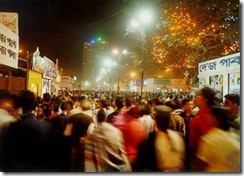Quite a few days back I got an email from a former classmate presently working in Hyderabad in a company called Google. It was one of those chain mails that keep crossing the cyberspace defying all laws of physics – there is no kinetic friction to slow down the messages. I am reproducing the message for your reading pleasure:
Being an Indian, I request you to read this mail to the end…
Lt.Saurabh Kalia of 4 JAT Regiment of the Indian Army laid down his life at the young age of 22 for the nation while guarding the frontiers at Kargil. His parents,indeed the Indian Army and nation itself, lost a dedicated, honest and brave son. He was the first officer to detect and inform about Pakistani intrusion. Pakistan captured him and his patrol party of 5 brave men alive on May 15,1999 from the Indian side of LOC. They were kept in captivity for three weeks a nd subjected to unprecedented brutal torture, evident from their bodies handed over by Pakistan Army on June 9, 1999.The Pakistanis indulged in dastardly acts of inflicting burns on the Indians with cigarettes, piercing their ears with hot rods, removing their eyes before puncturing them and breaking most of the bones and teeth. They even chopped off various limbs and private organs of the Indian soldiers besides inflicting unimaginable physical and mental torture. Af ter 22 days of torture, the brave soldiers were ultimately shot dead.A detailed post-mortem report is with the Indian Army. Pakistan dared to humiliate India this way outing international norms. They proved the extent to which they can degrade humanity. However, the Indian soldiers did not break while undergoing all this nimaginable barbarism, wh ich speaks volumes of their patriotism, grit,determination,tenacity and valour -something all of India should be proud of. Sacrificing oneself for the nation is an honour every soldier would be proud of, but no parent,army or nation can accept what happened to these brave sons of India. I am afraid every parent may think twice to send their child in the armed forces if we all fall short of our duty in safeguarding the PRISONERS OF WAR AND LET THEM MEET THE FATE OF LT.SAURABH KALIA. It may also send a demoralizing signal to the army personnel fighting for the Nation that our POWs in Pak cannot be taken care of. It is a matter of shame and disgust that most of Indian Human Rights Organisations by and large,showed apathy in this matter. Through this humble submission, may I appeal to all the civilized people irrespective of colour, caste, region, religion and political lineage to stir their conscience and rise to take this as a NATIONAL ISSUE? International Human Rights Organisations must be approached to expose and pressure Pakistan to identify,book and punish all those who perpetrated this heinous crime to our men in uniform. If Pakistan is allowed to go unpunished in this case, we can imagine the consequences. Below is the list of 5 other soldiers who preferred to die for the country rather than open their mouths in front of enemy.
Since I was an Indian, I read the mail till the end. The mail was followed by a truncated list of names of people who had bothered to ‘associate’ themselves with the cause of getting justice for Captain Saurav Kalia and the other martyred soldiers. This mail gave rise to many feelings, and I shall try my best to put words to them.
- Was the outrage perpetrated against Saurav an outrage against humanity, or against India? If it is the former, the question remains why does it require my being an Indian to read and appreciate the narration? What if I were a Pakistani?
- Why does this death acquire such poignancy? Because Captain Saurav Kalia was a Commissioned officer? Because he was young and promising? Because just a few days before his valourous death, he said on NDTV after conquering a (Tiger?) Hill “yeh dil maange more” (or was it someone else? Please correct me if you know more, and please bother to tell your source)? Because the media, which always needs stories, made it much bigger than it would otherwise have been? What about the hundreds dead in the same conflict in the summer of 1999?
- Why does the death appear so gruesome when we KNOW that justice and humanity are rotten excuses in the filthy world of statecraft? Should someone think statcraft is dispensable, what then is the alternative? Civil war with human life “nasty, brutish and short”?
- What is the motive behind such arm-chair activism (which, ironically, is the same thing that I am indulging in!)? What is patriotism, after all? Why must one support the army if one is a patriot? Is such activism a penance for the accepting the luxuries of life while the jawans battle weather and foe to ensure our safety?
The recent movie Rang de basanti seems to have done what scores of patriotic songs could not have done. Once every blue moon comes a chapter in the life of the nation that seems to capture the mood of the nation, or perhaps moulds that mood into an expression. Lagaan did it. So did, on a smaller level Gadar and Swades. While this is not the forum for discussion on the merit of the movies, it does seem to be the case that the silver screen has an effect upon the youth of this country that few other things have. And I wonder, if this latest chain mail that knocks on patriotism, is just another thoughless but emotive expression of that mood.
Khoon se khelenge holi, ‘gar watan mushkil me hai
Sarfaroshi ki tamanna ab hamare dil me hai….
